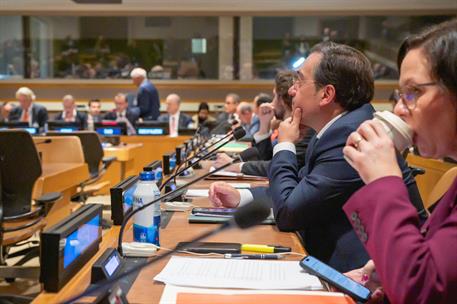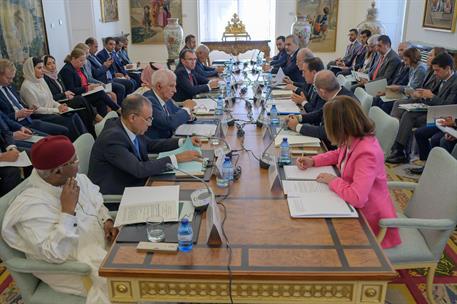Council of Ministers
The Government of Spain modernises the Consular Register to make it easier for citizens to complete procedures abroad
Council of Ministers - 2024.10.1
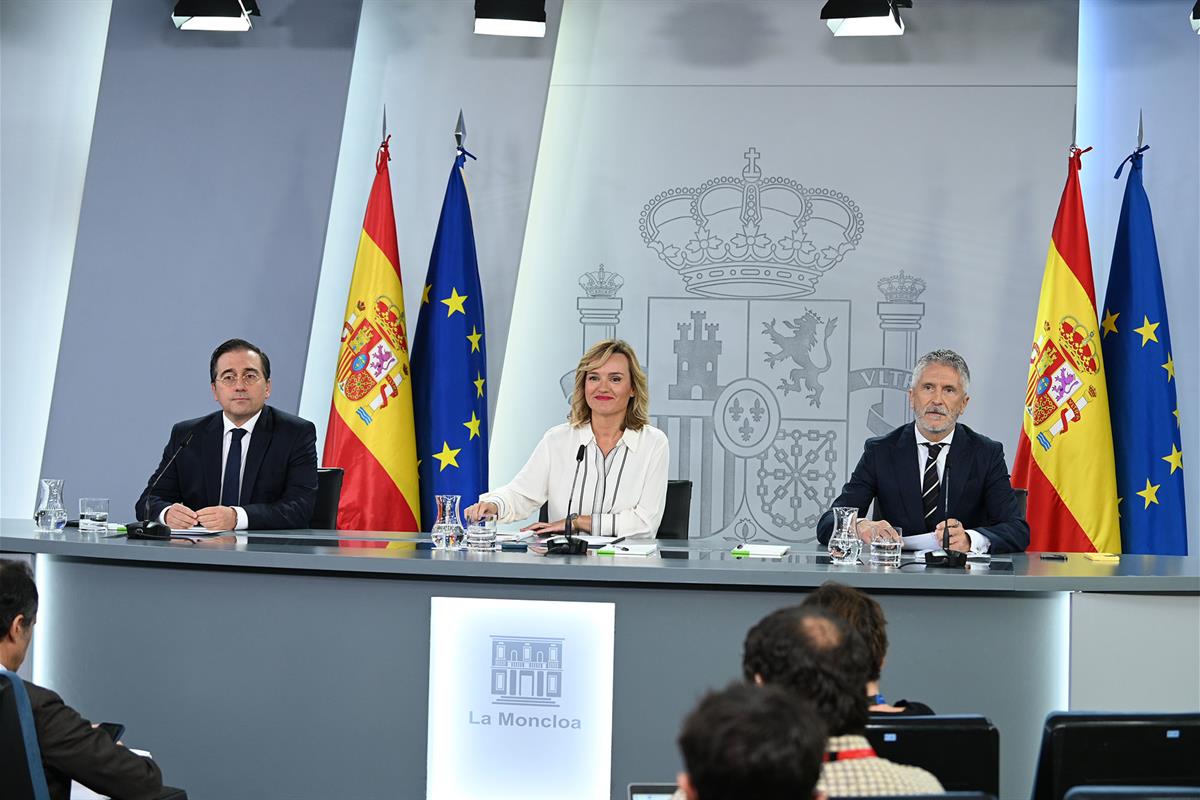 The Minister for Foreign Affairs, European Union and Cooperation, José Manuel Albares, the Minister for Education, Vocational Training and Sports and Government Spokesperson, Pilar Alegría, and the Minister for Home Affairs, Fernando Grande-Marlaska (Pool Moncloa /Borja Puig de la Bellacasa)
The Minister for Foreign Affairs, European Union and Cooperation, José Manuel Albares, the Minister for Education, Vocational Training and Sports and Government Spokesperson, Pilar Alegría, and the Minister for Home Affairs, Fernando Grande-Marlaska (Pool Moncloa /Borja Puig de la Bellacasa)
The Council of Ministers has approved the Royal Decree on the the registration of persons of Spanish nationality in the registers of consular offices abroad.
The Minister for Foreign Affairs, European Union and Cooperation, José Manuel Albares, explained that this regulation "is an essential part of the consular digitalisation process" that will be completed by the end of 2025 and represents a further step in the modernisation of consular services. "It is about taking advantage of the opportunities offered by the new digital tools to achieve an administration abroad that is more agile, closer and, above all, more useful and faster for our citizens," he said.
The Consular Register, which collects information on Spaniards abroad -almost three million citizens-, is a key tool for them to exercise, for example, their right to vote, and will enable consular services to improve consular protection and assistance to people who need it, added the minister.
Albares said that the new registry will mean citizens will not always have to physically travel to an office because certain procedures can be carried out online. It will also allow for the creation of a unique and unchangeable Central Consular Identification Number (CCIN) to facilitate procedures. However, the minister clarified that this register is in addition to the previous one, but does not replace it, and that citizens who wish to continue to carry out procedures in person will still be able to do so. The distinction between persons resident abroad, for whom registration will continue to be compulsory, and non-residents, for whom it will be optional, is also maintained.
In short, the Foreign Affairs Minister remarked, it is a process of "modernisation of our consular service that will facilitate speed and agility, without the need for face-to-face visits, for our citizens who live outside our borders, and will allow us to offer efficient, close and modern consular assistance".
Situation in the Middle East
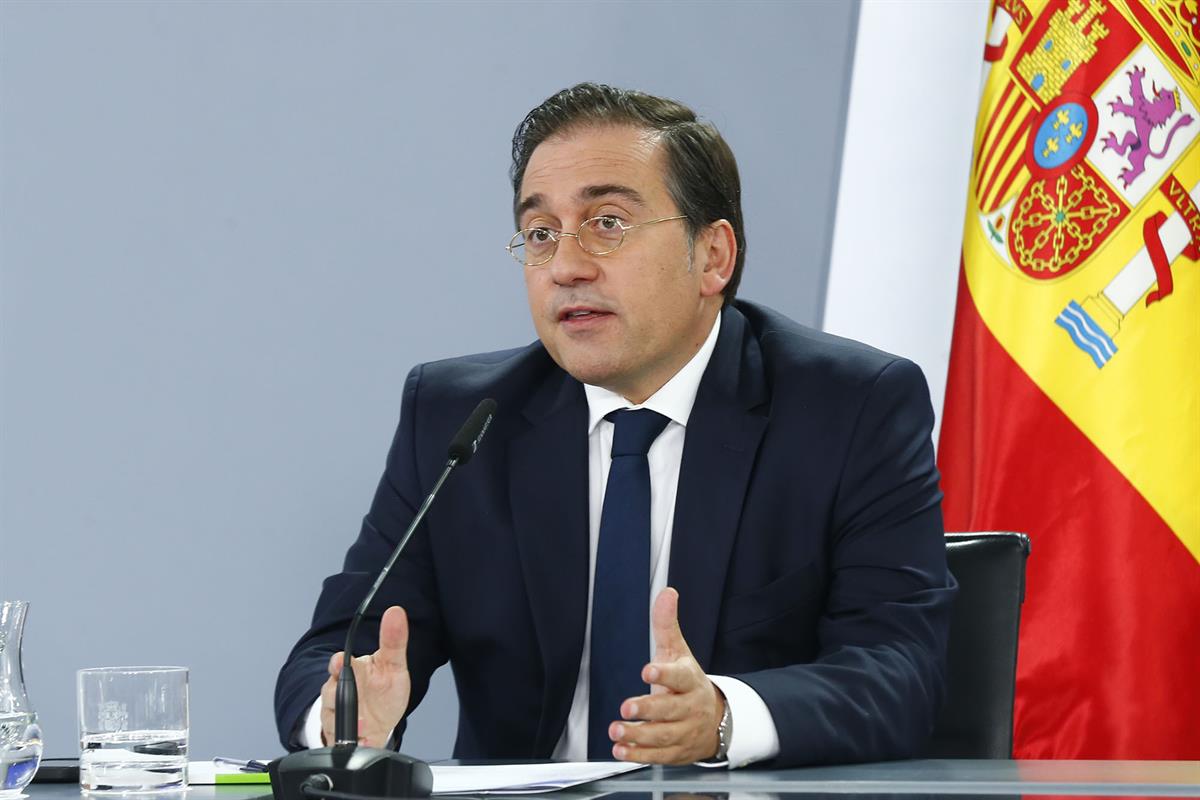 The Minister for Foreign Affairs, European Union and Cooperation, José Manuel Albares, at the press conference after the Council of Ministers | Pool Moncloa / Jose Manuel Álvarez
The Minister for Foreign Affairs, European Union and Cooperation, José Manuel Albares, at the press conference after the Council of Ministers | Pool Moncloa / Jose Manuel Álvarez
During its meeting today, the Council of Ministers also discussed the conflict in the Middle East, which has spread to Lebanon, has already caused 1,600 deaths in that country and has forced more than a million people to flee their homes.
José Manuel Albares stated that it is "an unbearable conflict" that must cease as soon as possible and to which Spanish foreign policy will not resign itself. In this regard, the minister recalled that he had pushed for the two-state solution at the UN General Assembly last Friday, where he held a number of bilateral meetings, including with his Iranian counterpart. He also spoke yesterday with his counterparts from Jordan and the Persian Gulf states, which are key to regional stability.
Spain also brought together on 13 September members of the Arab-Islamic Contact Group on Gaza and representatives of European countries committed to pushing for the recognition of Palestine to jointly address the two-state solution: a State of Israel and a State of Palestine living side by side in peace and security.
The Government, the minister remarked, has been advocating for a year that an immediate ceasefire in Gaza is essential to begin de-escalation and the release of the hostages. Moreover, in the case of Lebanon, the ground invasion must stop. Spain is firmly committed to the implementation of UN Security Council Resolution 1701, which, in the minister's opinion, still contains all the elements necessary to resolve this crisis, and which must be fully implemented by the parties.
Albares maintained that Spain will continue to work together with its European, Arab and international partners and with the countries of the region to contain the escalation and lay the foundations for a lasting peace.
Humanitarian aid for Lebanon
The foreign minister added that Spain, as it did in Gaza, is taking immediate steps to address the humanitarian situation: "Through the Spanish Agency for International Development Cooperation (AECID), we have increased humanitarian funding to Lebanon. In recent weeks, we have made an initial emergency contribution of one million euros to the International Federation of Red Cross and Red Crescent Societies to relieve pressure on local resources and support the displaced and injured population.
The minister also reported that Spain is preparing an urgent shipment of medicines through the World Health Organisation (WHO), worth 150,000 euros, and will allocate a further 200,000 euros to the emergency medical teams that the WHO has activated to provide medical assistance. The government is also keeping the emergency agreements with NGOs active so that AECID can channel its resources.
Since the escalation began, Spain has allocated 1.5 million euros in humanitarian aid and is considering additional contributions, in addition to the 3.3 million euros planned for Lebanon this year, according to the minister. "We are talking about 5 million euros or so already disbursed to Lebanon in emergency aid, and this is in addition to the announcement I made on my trip to Lebanon earlier this year, where I announced that we were quadrupling our aid to this country, a very fragile country, to 30 million euros," he said.
Situation of Spaniards in Lebanon
During his speech, Albares gave assurance that his ministry and the Spanish embassy in Beirut are closely monitoring the situation of Spaniards in Lebanon, who are "our absolute priority". "We have counted in our consular register just over a thousand Spaniards, including Spanish nationals, dual nationals, foreign relatives and people in transit, among them a dozen journalists. And, of course, the Spanish contingent, under the United Nations flag".
Spain contributes 669 troops to the United Nations Interim Force in Lebanon (UNIFIL), under the United Nations flag, to whom the minister conveyed his "solidarity and gratitude for the invaluable work they do in favour of peace and the defence of international law".
Moreover, José Manuel Albares called on Spaniards to leave Lebanon by the commercial means still available and has advised against travelling to Lebanon under any circumstances: "I would once again urge Spaniards to leave the country while there are commercial flights, especially those who are in transit for tourism or work, and we ask the rest to keep a close eye on the embassy's social networks, which are updating their information, and also to check their emails, where we are asking them to confirm their addresses and telephone numbers, which we have in the consular register. In addition, he assured that the Executive has an evacuation plan ready if it becomes necessary.
Aid for the victims of emergencies
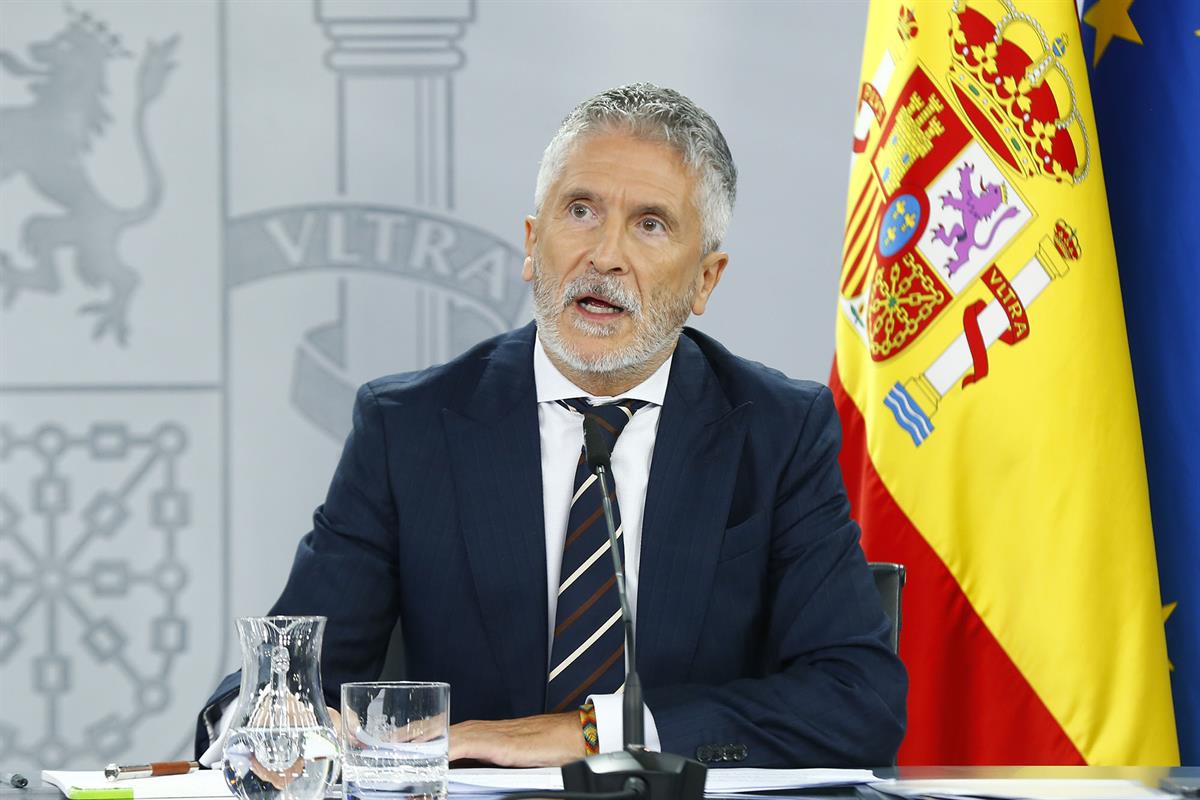 The Minister for Home Affairs, Fernando Grande-Marlaska, at the press conference after the Council of Ministers | Pool Moncloa / Jose Manuel Álvarez
The Minister for Home Affairs, Fernando Grande-Marlaska, at the press conference after the Council of Ministers | Pool Moncloa / Jose Manuel Álvarez
The Council of Ministers has declared areas seriously affected by civil protection emergencies in a total of 176 territories in 14 autonomous communities which, between 27 February and 14 September, were affected by adverse weather events, forest fires or disasters of various kinds. The declaration enables those affected to claim the aid provided for in the Law on the National Civil Protection System.
The territories belong to the communities of Andalusia, Aragon, Canary Islands, Castile-La Mancha, Castile and Leon, Catalonia, Community of Madrid, Community of Navarre, Community of Valencia, Extremadura, Galicia, Balearic Islands, La Rioja and Region of Murcia.
Among these episodes, the Minister for Home Affairs, Fernando Grande-Marlaska, highlighted the storm that particularly affected the provinces of Burgos, Navarre, La Rioja and Zaragoza in the last days of February, the isolated depression at high levels (DANA) that caused heavy rain and storms in mid-August in the Balearic Islands and the numerous forest fires recorded in various areas of the national territory.
Compensation for damages and tax benefits
According to the minister, these 176 events have caused personal damage to infrastructures and public and private property that justify the intervention of the General State Administration. Grande-Marlaska recalled that this action is based on the principle of inter-territorial solidarity and comes in addition to the actions carried out by each autonomous community in accordance with its competences.
The declaration of an area affected by a civil protection emergency opens the way for those affected to claim the planned aid from the State, which includes compensation for personal damage, destruction of basic necessities and total or partial destruction of the habitual residence. This aid corresponds to the Ministry of Home Affairs, which will also look into other possible measures, such as exemption from paying the fees of the autonomous body of the Jefatura Central de Tráfico for the issuing of duplicate driving licences, as well as for the issuing of DNIs (National Identity Cards).
The Minister for Home Affairs added that other ministerial departments will assess the possibility of establishing other aid, such as tax benefits related to Property Tax or Economic Activities Tax. Labour measures and rebates on social security contributions may also be agreed, as well as aid to local authorities to repair damaged municipal infrastructure, installations and equipment, which may be contracted out under the emergency procedure if necessary.
Investment in infrastructure: Euskadi and Gilbraltar
The Minister for Education, Vocational Training and Sports and Government Spokesperson, Pilar Alegría, at the press conference after the Council of Ministers | Pool Moncloa /Borja Puig de la Bellacasa
Minister for Education, Vocational Training and Sports and Government Spokesperson of the Government, Pilar Alegría, has reported that the Council of Ministers has approved an investment of 146.3 million euros in the final stretch of the Basque Y and another 7.3 million in the Campo de Gibraltar area.
Alegría explained that the Government's investment in the Basque Country, which she described as "decisive", is focused on the Arkaute railway junction and will enable "crucial" passage between the Basque Country and the peninsula. Adif will invest 34.7 million euros in this project from its own budget.
On the other hand, the aid approved in Gibraltar will go towards improving water cycle infrastructures and revitalising the natural environment in eight municipalities in the region, an investment included, according to the spokeswoman, in the Plan for the Campo de Gibraltar that the Executive has been developing since 2018.
Developments in the Democracy Action Plan and the Open Government Partnership
Alegría also announced that the Interministerial Commission for the Follow-up and Promotion of the Action Plan for Democracy has been set up today. The spokeswoman recalled the main objectives of this committee: The Plan was presented to the Council of Ministers on 17 September, and the Commission has been entrusted with "the promotion and coordination of measures, monitoring of actions, proposals for improvements and evaluation of compliance with the Plan". presented at the Council of Ministers on 17 September, with a total of 11 lines of action and 31 measures aimed at reinforcing transparency, pluralism and the right to information.
Minister for the Presidency, Justice and Parliamentary Relations, Félix Bolaños, and includes the Minister for Culture, Ernest Urtasun, as Vice-President; the First Vice-President and Minister for Treasury, María Jesús Montero; the Second Vice-President and Minister for Work and Social Economy, Yolanda Díaz; the Minister for Home Affairs, Fernando Grande-Marlaska; the Minister for Economy, Trade and Enterprise, Carlos Cuerpo; the Minister for Digital Transformation and the Civil Service, Óscar López; and the Secretary of State for Communication, Francesc Vallès.
Also in the field of transparency, the government spokeswoman reported that from today Spain will assume the co-presidency of the Open Government Partnership, an initiative promoted by the former president of the United States, Barack Obama, which brings together 75 countries and more than 100 local governments with the aim of improving accountability and public participation.
Current affairs: Incidents at the Metropolitano
With regard to the violent incidents that took place last Sunday at the Metropolitano stadium during the match between Atlético de Madrid and Real Madrid, the Minister for Sports expressed her "categorical condemnation" of these incidents, which, according to the Minister, "are absolutely contrary to the values that sport promotes". In this regard, Alegría said that the proposed sanction will be "forceful and severe".
The spokesperson for the Executive, who recalled that the Permanent Commission against Violence in Sport met yesterday to address this issue, stressed the importance of the collaboration of the clubs, the league and the federations themselves to eradicate violence in stadiums, because these events "directly attack the magnificent image of Spanish football".
Non official translation





